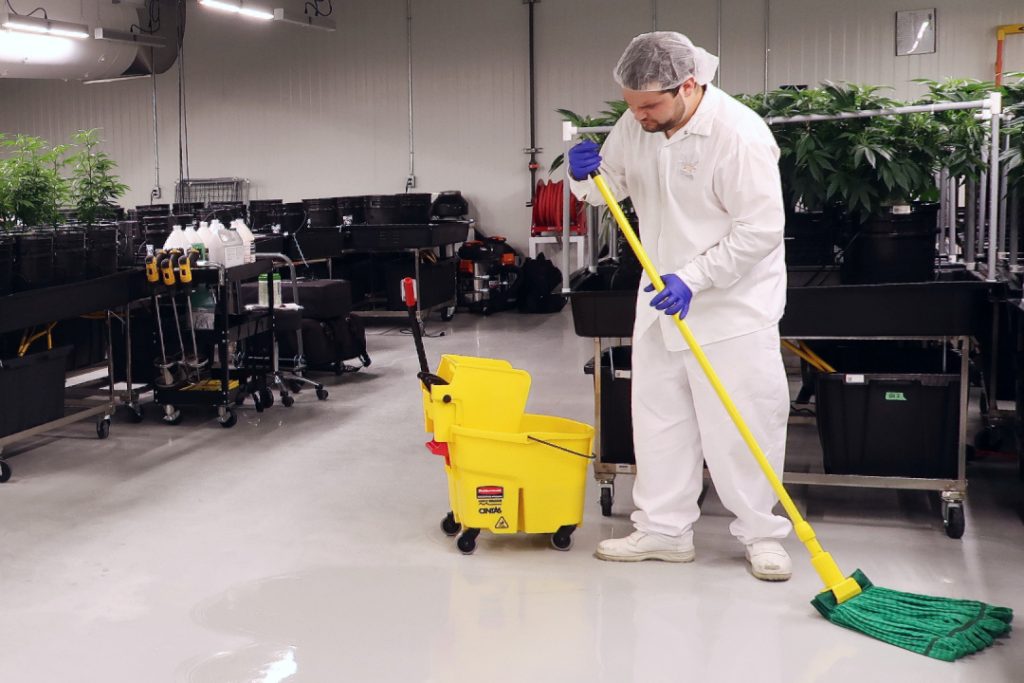
Features
Covid-19 Updates
Business
Human Resources
Management
Bracing for COVID-19
Crisis management expert shares business advice on navigating through a pandemic
March 18, 2020 By Jean Ko Din
 Businesses must be proactive in helping combat the spread of COVID-19, said crisis management expert Suzanne Bernier. (Credit: Jean Ko Din)
Businesses must be proactive in helping combat the spread of COVID-19, said crisis management expert Suzanne Bernier. (Credit: Jean Ko Din) Now is not the time for half measures.
Suzanne Bernier, an internationally-recognized crisis expert, is calling for businesses to be more proactive in combatting the spread of the COVID-19 pandemic. She said that in order to “flatten the curve” and prevent healthcare systems from being overloaded with new cases, non-essential services should take immediate measures to protect its employees.
“It is going to get a lot worse before it gets better,” said Bernier, who has more than 20 years experience helping governments, communities and organizations plan and respond to disasters. “Based on historical evidence of previous pandemics, there will always be additional waves. So I’m trying to advise people ahead of time, just to communicate.”
For essential service workers, Bernier said it is critical that employers encourage its employees to take all health and hygiene measures seriously – wash you hands thoroughly for 20 seconds with soap and water, practice social distancing of at least six feet away from each other and if you are sick, stay home and monitor your symptoms. These measures are simple but it will save lives, she said.
Bernier is the president of SB Crisis Consulting. She has been involved in helping communities respond, rebuild and recover from numerous crisis events, including the 9/11 terror attacks, Hurricane Katrina, Hurricane Sandy, the H1N1 pandemic and the 1998 “Ice Storm of the Century” in Eastern Canada.
In 2016, she was named “Continuity & Resilience Consultant of the Year” at North America’s Business Continuity Institute. She was a guest speaker at The White House during FEMA’s 2016 Individual and Community Preparedness Awards ceremony.
In between fielding calls from several organizations and media outlets, Bernier sat down with Grow Opportunity to share her views on what companies need to do to manage risks in spreading the virus.

Suzanne Bernier, president of SB Crisis Consulting
Grow Opportunity: Have you had an influx of calls lately? What are the questions and concerns that companies and organizations are asking you right now?
Suzanne Bernier: It’s clear that a lot of governments, organizations and businesses were not well-equipped ahead of time to be able to pull out those plans when we first saw the novel coronavirus appear in China […] We’re going to see those numbers increase a lot. In the meantime, we’re seeing every industry, as you can tell – I mean every hour, there’s a new story or a news cast of different industries – everybody’s going to be impacted. Everybody’s already starting to be impacted. […]
So that’s what I find myself in the middle of, is really just fielding calls and trying to answer people’s concerns. I’m not really running a business right now. What I’m doing is trying to be able to share with Canada, North America and the world what we’ve learned from SARS; what we’ve learned as we’ve researched from other pandemics; what to expect; and what to plan for; and what’s coming next.
GO: Given your breadth of expertise, do you think that the global response to COVID-19 is completely different? What are the lessons we’ve learned from SARS and other past epidemics that are applicable to our current situation? What is not?
SB: We’re seeing now that this new COVID-19 is a lot more serious than SARS was. Now SARS was very serious in the Greater Toronto Area and we had 44 deaths in our community alone, but I can tell you from what we’re seeing, the rapid spread of this coronavirus is much more concerning than even SARS was. […]
Now, a lot of the lessons that we learned from SARS, yes, are applicable and are being implemented now. But we also, after SARS, we started looking at working on a plan, at least in Ontario, on what would happen if and when we saw a much larger pandemic scenario, which we all knew would happen eventually. We just didn’t know when.
So there’s some great guidelines and plans and guidance that have been developed throughout the years and shared with governments and organizations. However, what also happened is, if you remember in 2009, we did have a global pandemic which was called H1N1. However, it was a very mild pandemic. We didn’t see much spread. We didn’t see much severe illness and deaths from it.
Because of that, a lot of governments and organizations I saw kind of thought, “Oh, well if this is the global pandemic we were planning for, well we got through that okay.” And then a lot of companies and businesses kind of shelved their plans after, thinking, “Okay well that was the pandemic. Wasn’t so bad.”
But we’ve been warning people that there could very well be, in our lifetime, a major scale pandemic and that is what we’re in the middle of now. And now we are in reactive mode as opposed to mitigation and proactive mode because all of us have waited a bit too long to implement some serious measures that should’ve been implemented a couple of weeks ago, frankly.
GO: How important is it for companies to be agile? How should they be fielding questions that their employees have, and also the questions that their customers have?
SB: Right, well I’d say that, they have now access to pretty much every major (authority), from the Centre for Disease Control to the Canadian government to your provincial health authorities to your local health authorities. They now have great resources online to access.
First of all, to be able to tell your employees, “Here, print out this self-assessment sheet. If you feel any of these symptoms, don’t come to work.” And I’m talking about essential workers because I believe seriously that at this moment in time […] we have to be serious about this. And we have to shut down any non-critical, essential services before this spreads further.
And I’m going to caution people now because it’s going to happen. And I’m not trying to scare people. I’m just trying to be a realist. Based on evidence that’s happened in SARS, as well as H1N1, it wasn’t nearly as rampant or deadly as this virus that we’re seeing.
You’re going to see people who are going to refuse to come to work because of their safety. You’re going to see cases, if you allow people to come in to work environments, you are definitely going to see cases at work of people having the virus. And so you have to think about, how are you going to handle that?
If and when somebody shows up, or afterwards, you find out and they’re advised that somebody came in and five days later they’ve been diagnosed with the coronavirus, what are you going to do? What decisions are you going to make to ensure that you try to, not encourage but demand, that any potential employees that have encountered that employee to stay home, stay isolated for at least 14 days. That message has to be drilled into people now because this is critical at this point. The spread is going to continue to rise until it falls.
And I do believe that we are going to see more orders coming into play over the next several days and weeks as we see how the different communities are impacted. And so, businesses need to start really thinking about that.
GO: Do you have any advise for those essential industries who are nervous because they feel more exposed and they have to come in to work, like post office workers, police officers, firefighters, emergency responders, etc.
SB: I can tell you that you’re going to see a reduced staffing level for, even those who maintain critical functions, to be able to try to prevent a large number of people working on things at the same time. People staggering hours of operation, coming in at different times to be able to try to avoid spreading the virus, if somebody does fall ill. The social distancing is huge, of the remaining six feet away from other people.
And again, it’s really going to come down to what the government says is critical […] And of course, those people are needed. And they are needed to stay healthy. So the best way that we can keep them healthy is to encourage any non-essential workers to not be out there, potentially spreading the virus to our essential and critical workers.
GO: For those that are in non-essential sectors that are hesitant in slowing down production and shutting down their facilities, what is your opinion on that? What do you say to these companies who are looking to avoid productivity slowdowns as much as possible?
SB: There are a lot of businesses in this world that are thinking the same thing and don’t want to do that and have very legitimate, valid reasons why they shouldn’t in any normal situation. Or in a smaller pandemic situation. But I can tell you right now, that people should be thinking about what really is critical right now and how to be able to curb the spread within your own organizations.
So those manufacturers and those producers, regardless of what it is, cannabis or anything else, what they should really be thinking about is do they want to be a part of a spread within their own employee base? That is guaranteed to happen if people don’t take this seriously and get people together, without the proper space between them, providing non-critical, non-life-saving services for the next several weeks.
GO: Was there anything else that businesses need to know?
SB: Be prepared for an order to potentially be like Italy or Spain, for citizens to be sheltered in place. So what do you do when all of your workers or most of your workers are told to shelter in place?
Hopefully, we don’t get to that. The only way we’re not going to get to that here is if we do, right now, what we’re being ordered to do and everybody in the public takes it seriously. I don’t normally sound this dire but it’s just really important to get this message out to people now before it’s too late and we get into an Italy situation.
One, wash your hands. Encourage every single person in this community to wash their hands regularly, especially if they’re out in public and they’ve touched anything whatsoever. Even if they’ve not, as soon as they come back into their home or even if they’re out and they have access to water, 20 seconds, wash thoroughly with soap. And of course, all other hygiene things like cover your cough.
And the second message is monitor symptoms. If you’re sick, stay at home. And if anything, I would say if you’re not essential, stay at home throughout this heightened pandemic period.
And the third thing is the social distancing, where if you have to absolutely be in public, make sure you stay away, at least six feet, away from everybody else around you.
And on that, if we can follow those three things well, hopefully not to be ordered to do any of those things, then we can maybe help prevent the additional spread like that we’ve seen in other countries. But there’s no guarantee right now. But what we can do is all try and support each other. And it’s not about business and keeping on business. It’s about saving lives and making sure that our employees are safe.
Print this page